AAG is Proud to Announce the 2019 AAG Honors
Each year, the AAG invites nominations for AAG Honors to be conferred in recognition of outstanding contributions to the advancement or welfare of the profession. The AAG Honors Committee is charged with making award recommendations for each category, with no more than two awards given in any one category. This year, the AAG Honors Committee and the AAG Council are pleased to announce the following AAG Honorees to be recognized during the 2019 AAG Annual Meeting Awards Luncheon.
2019 AAG Lifetime Achievement Honors
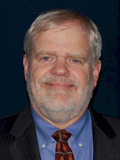 Thomas J. Baerwald
Thomas J. Baerwald
Dr. Thomas Baerwald, Geography and Spatial Science Program Director at the National Science Foundation and former AAG President, has had tremendous influence across the entire discipline of geography. After teaching in higher education and ten years working as a science advisor at the Science Museum of Minnesota, Dr. Baerwald was hired to the National Science Foundation (NSF) in 1988 as Program Officer in what was then the Geography and Regional Science (GRS) Program. He has since then held various positions at NSF, including Deputy Assistant Director in the Geosciences Directorate, and also other Division Directorships within NSF. Throughout his career, Dr. Baerwald’s exceptional wisdom, deep commitment to the science and practice of geography, and institutional acumen have advanced the profile of geography and geographical research for more than 30 years.
Dr. Baerwald transformed geography through his excellent guidance of the rigorous and deliberate review process of proposals in geography and geospatial science, funding many scholars to pursue scientific discovery and science education. Dr. Baerwald also developed initiatives and promoted interdisciplinary research, particularly the program on coupled natural and human systems. Moreover, his skill as a leader of inter- and multi-disciplinary programs at NSF has elevated and sustained the profile of the discipline of geography within that institution. Beyond his own areas of special expertise, Tom is well versed in the full range of geographical investigations and has strongly supported social science research.
Dr. Baerwald has been very active in our professional organizations in seminal ways, serving in leadership roles at the regional and national level in the AAG, including as President. While president he initiated several programs of lasting value, and instilled a refreshingly positive attitude regarding diversity. In addition, Dr. Baerwald contributed his organizational and intellectual talents to enhance geography education, from the K-12 level to graduate and post-doctoral levels. He is known for his wise counsel, openness to new ideas, and inclusive policies toward women. As one letter writer stated, “Tom is a gregarious yet humble man, one who prefers to work behind the scenes to enable others to achieve success. His career has completely centered on helping others do great things in geography. He cares deeply about all those whom he interacts with at all levels.”
Dr. Baerwald’s achievements have been recognized over time with numerous, prestigious awards. These include Director’s Awards for Collaborative Integration at the National Science Foundation, and the NSF Director’s Superior Accomplishment Award (2001). He is a fellow of the American Association for the Advancement of Science (since 2003) and fellow of the AAG. He also received AAG’s Distinguished Service Honors in 1997.
Dr. Baerwald’s leadership at NSF and his academic contributions, his diligent advancement of geography and groundbreaking interdisciplinary environmental research at NSF, and his long-term commitment to the AAG define a career of selfless service and accomplishment that have advanced scholarship, science, and practice of geography for decades to come.
Dr. Baerwald’s vision, institutional expertise, and ability to engage the community of geographers put him in a lifetime-achievement league of his own. The AAG proudly confers its 2019 AAG Lifetime Achievement Honors upon Thomas Baerwald.
 Joe T. Darden
Joe T. Darden
During his almost half-century long distinguished career, Professor Joe T. Darden of Michigan State University (MSU) has produced seven books and about 160 journal articles and book chapters, and secured significant external grants. His work on residential segregation, housing discrimination, immigration, socio-economic neighborhood inequality in multiracial societies, housing and health care disparity for minorities has exerted influential impacts on geography, urban studies and urban affairs, urban planning, sociology, and political science.
Darden was one of the few African American geographers in the early 1970s and one of its earliest full professors. As an urban social geographer, he devoted his entire career on racial-ethnic segregation and the resulting social inequality that generate racialized socioeconomic, education, employment and gendered locations affecting life chances and outcomes. The broader impacts of his work on racial inequality are reflected in his publications in popular media, his public policy consultation, and his comparative work between the US and Canada. His scholarship has been recognized as interdisciplinary, path-breaking and transformative. He prompts other scholars to think beyond the box by challenging the conventional wisdom and the prevalent paradigms for our field and our society.
Darden is also an effective teacher and a caring mentor for students and junior to mid-career colleagues. His long-standing course, “The Ghetto,” at MSU draws new students into the discipline. Darden’s role as a mentor, however, has gone beyond MSU to countless other students and scholars nationwide. As his nominators and supporters noted, and as can be attested by many, Darden consistently mentored many who were not his students, but who benefited a great deal by his crucial career advice, his support of their development and by serving as a trusted ally to them.
Darden rose fast in the academic and administrative ranks at MSU. He became full professor and the Acting Chair of Department of Urban and Metropolitan Studies in 1980, and Dean of Urban Affairs Programs in 1984. In this capacity, he was able to bring geographical perspectives to urban studies at MSU for 14 years.
Darden is a tireless and vocal leader for inclusiveness and diversity in geography in general and for the AAG in particular. 20 years ago, he led the efforts to advocate for geography departments nationwide to admit and support more students from underprivileged and underrepresented minority groups; and he has provided crucial leadership in such endeavors for both students and faculty by leading the AAG’s Diversity Taskforce. In 2016, he received the AAG’s Harold M. Rose Award for Anti-Racism Research and Practice.
Darden’s influential work has earned him some major academic awards. Among them, he is the recipient of MSU’s Distinguished Faculty Award (1984); the Ethnic Geography Specialty Group’s Distinguished Scholar Award (2006), the AAG Enhancing Diversity Award (2006), and the Distinguished Ethnic Geography Career Award (2015). In 2018 he was elected to the inaugural cohort of AAG Fellows.
For these reasons and many more, Joe T. Darden is granted the 2019 AAG Lifetime Achievement Honors.
2019 AAG Distinguished Scholarship Honors
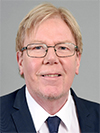 A. Stewart Fotheringham
A. Stewart Fotheringham
Alexander Stewart Fotheringham, is a renowned spatial scientist. Through his early work on spatial interaction modelling – especially in the context of intervening opportunity – Fotheringham established himself as a foundational contributor to applied methodological developments in spatial analysis.
His co-authored book on Geographically Weighted Regression is a touchstone in the field. Indeed, as one of his nominators asserted “Geographically Weighted Regression will be recognized as one of the most important breakthroughs in Geographic Information Science in the early 21st Century.” The suite of spatial techniques derived from Geographically Weighted Regression is incorporated into powerful spatial analysis engines by ArcMap and the statistical analysis package R, allowing for analysis of some of society’s most pressing problems and the democratization of these potent techniques. This book is part of a long trajectory of formal publishing, which includes a dozen authored, co-authored or edited books, almost 40 book chapters, and about one hundred reviewed articles. Such a record merits recognition as an exemplary scholar.
Dr. Fotheringham has been appointed to Professorships and other administrative positions around the world, and has also received high-level recognition in scientific and social science academies in the United States, the United Kingdom and Europe. He served the European Union Joint Planning Initiative while at the National University of Ireland, and was appointed to numerous Fellowships, visiting Professorships and other scholarly appointments worldwide. His former colleagues all attest to the respect he earned in an array of academic and professional communities.
Fotheringham’s continued commitment to innovation includes work with graduate students on the use of Global Positioning System (GPS) data for the analysis of commuting patterns. Fotheringham’s development of techniques to drive spatial analysis into the era of big data position him in the forefront of analyses of everything from forest fires, cancer clusters, and climate change.
For his pioneering and novel methodological innovations in spatial analysis; for his consistent and continuous commitment to the dissemination of new techniques and empirical findings; for his deep and enduring impact on theoretical and applied literature in Geography; and for his achievements in scholarly and professional domains across the academy, A. Stewart Fotheringham is recognized with the 2019 AAG Distinguished Scholarship Honors.
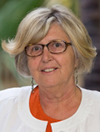 Helga Leitner
Helga Leitner
In the course of Helga Leitner’s distinguished career, she has made sustained and significant contributions to human geography as well as the social sciences and humanities more broadly. Her approach to research and scholarship has resulted in applied research that is both theoretically-informed and socially beneficial. Her academic record also demonstrates her extensive mentorship of junior scholars.
As a researcher, Helga’s scholarship has offered theoretical and empirical insights to some of the most critically important phenomena influencing contemporary cities. Her contributions in this area include foundational work on migration and immigration, pioneering studies of the politics of citizenship, and important contributions to (trans)local activism. This work has contributed to a deeply geographical perspective to international debates in social science on citizenship, and speaks to important interdisciplinary debates about identity, transnationalism, and the relational character of places.
Helga has also made sustained and significant contributions to urban theory, including work on entrepreneurial urbanism, urban networking, and urban governance through spatial technologies. She was one of the first human geographers to appreciate the growing interrelationship between economic globalization and the competitive policies of cities. Her research on global urbanism is advancing efforts to internationalize urban theory by challenging Eurocentric epistemologies and contributing to new methodologies of theorization. Her landmark papers include highly cited journal articles in the Annals, Urban Geography, Political Geography, Environment and Planning A, and Progress in Human Geography.
Beyond the considerable impact of her own research, Helga has also played an important role in fostering the next generation of geographers and social scientists. In addition to serving on the editorial boards of several major journals, her commitment to building communities of inquiry and creating spaces of debate and dialogue is illustrated by her extensive and productive mentoring of graduate students and junior faculty. Helga has served on over 120 graduate committees and placed over 20 PhDs in top departments around the world. She has an outstanding record of co-authoring major articles with graduate students. Helga has also facilitated intellectually meaningful engagements between geographers in the Global North and South by spearheading numerous international conferences, seminars, and research collaborations.
In sum, Helga has had a profound effect on theory, practice, and education in geography. In addition to her extraordinary record of published scholarship, she has substantially enhanced the discipline through her decades of dedicated teaching and generous mentoring of early and mid-career geographers. For over three decades, she has modeled exemplary practices of independent scholarship, collaborative endeavors, and professional leadership for the next generation of geographic leaders.
For these reasons, the 2019 AAG Distinguished Scholarship Honors is awarded to Helga Leitner.
2019 AAG Ronald F. Abler Distinguished Service Honors
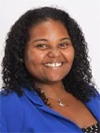 LaToya Eaves
LaToya Eaves
This year the Ron F. Abler Distinguished Service Honors is given to Dr. LaToya Eaves in honor of the transformative impact she has had on the AAG through her commitment to Black Geographies.
Several years ago, Eaves began convening a series of sessions entitled, “Black Matters are Spatial Matters.” These quickly became some of the most exciting events at AAG conferences, attracting standing-room only crowds who were hungry for a sustained intellectual engagement with Black Studies, and where Black scholars could congregate amidst the whiteness of the AAG. As the sessions became increasingly popular, Eaves took the lead in proposing a Black Geographies Specialty Group (BGSG). According to one nominator, “previous to BGSG, there was no one place where Black Geographers could wholly identify.” The establishment of the BGSG has had a profound impact on the AAG and the discipline of geography and must be recognized as a potential turning point for the discipline. Although there have been other attempts to promote Black geographies, anti-racist scholarship and Black scholars, the BGSG is distinct because it is a liberatory project that not only foregrounds the Black experience, but also attempts to hold geography accountable for its exclusions/inclusions of Black geographies and Black geographers. Moreover, BGSG is an organic formation, developed by and for Black geographers as well as all others interested in studying Black geographies and supporting Black geographers.
Besides providing an institutional home for Black Geographies, Eaves and the BGSG have also compiled a Black Geographies Reading list; organized a BGSG plenary; are developing travel and paper awards for students; and are exploring collaborations with Historically Black Colleges and Universities. Because of the import of Black Geographies, then AAG President Derek Alderman made Black Geographies one of the central themes of the 2018 AAG Meeting in New Orleans. Eaves served as the point person for the theme and made it a central part of the conference. The synergy and impact of the BGSG can also be seen in the development of the Latinx Geography Specialty Group, which was established in 2018. Eaves played an instrumental role in assisting the founders of the LGSG by sharing her experience and materials.
It is hardly a surprise that Dr. Eaves assumed a leadership role in creating the BGSG. She has worked tirelessly for over half a decade to carve out space within the AAG (and geography more broadly) for Black geographies, Black scholarship, and Black scholars. She has done this through institutional advocacy, mentorship, community engagement, and intellectual production. For example, she sat on the AAG Task Force on Diversifying the Curriculum in Geography. In terms of scholarship, she co-edited a special issue of The Southeastern Geographer focused on Black Geographies. As one of her nominators wrote, “Today, one cannot discuss the subfield of Black Geographies without also discussing Eaves…Black Geographies, as we know it today, is a product of Eaves’s professional commitment to Geography.”
Dr. LaToya Eaves makes the AAG an infinitely better organization and we proudly confer the 2019 AAG Ron Abler Distinguished Service Honors upon her.
2019 AAG Gilbert White Distinguished Service Honors
 Rebecca Torres
Rebecca Torres
Rebecca Torres is an inspiring and effective public intellectual and scholar activist. Over the last two decades, she has integrated her research, teaching, and service to promote social equity and justice. Her impressive track record of service to her department, university, and discipline is matched with an equally strong track record of meaningful, substantive public engagement in the communities in which she lives and studies.
Dr. Torres’ academic service covers many fronts. She is a noted mentor of undergraduate and graduate students both at the institutions where she has worked and more broadly. She also has nearly two decades of experience helping students engage substantively with questions of social equity and justice through service learning based projects. She has served on numerous campus and disciplinary taskforces and initiatives to enhance diversity and improve the climate for students and scholars of color. In addition, she is the co-organizer of the 9th Race, Ethnicity and Place conference, which took place in Texas in 2018.
Dr. Torres’ record of service outside the university is even more impressive. For example, while working at East Carolina University, she developed an award-winning community-university partnership — Los Puentes — to create and maintain a bilingual Spanish/English curriculum, which is still expanding to other regions fifteen years after its inception. More recently, her research on rural community development and poverty reduction included a five-year stint collaborating with The Workers’ Defense Fund in Texas, first documenting, and then promoting legislation to address issues such as dangerous working conditions, stolen wages, and social exclusion. Since 2014, she has put her safety on the line to study and publicize the precarious situation of migrant children at the U.S./Mexico border. In contributing to scholarly debates about neoliberalism, rural restructuring, migration, and gender, she has simultaneously engaged in substantive action to engage and serve her research communities.
Geographers are increasingly interested in serving as public intellectuals; Rebecca Torres shows us how to do it right. It is for these many reasons that the AAG is proud to recognize Dr. Torres with the 2019 AAG Gilbert White Distinguished Service Honors.
2019 AAG Media Achievement Award
 Minelle Mahtani
Minelle Mahtani
Minelle Mahtani, the recipient of this year’s AAG Media Achievement Award, is a scholar and communicator who connects geographic scholarship with public discourse. This award recognizes Mahtani’s exceptional contributions as the creator and host of Sense of Place, a daily radio show broadcast from 2015-2018 on Roundhouse Radio in Vancouver, British Columbia, and streamed globally. In her own words, Mahtani’s goal in creating Sense of Place was to: “Produce a show that showcased the in-depth geographical knowledge that informs the injustices that shape our landscapes in the city. I wanted to create a space where academics could share their research in a forum in which they felt respected, heard, understood. I wanted regular columnists who could be Indigenous, Black, people of color where the issues facing their communities could be amplified. Yes, it would be different, but it was the way to develop public dialogue on the issues that mattered to us as geographers.”
Through Sense of Place, Mahtani promoted public dialogue on issues of inclusion and equity. She provided a voice for people and groups who are under-represented on popular and public media. Mahtani fostered discussions of complex issues and challenged listeners to confront uncomfortable topics. As described by a listener, Sense of Place was “bold, unique, brave and truly inspiring.” On Sense of Place, Mahtani melded geographic scholarship with journalism and highlighted the importance of geographical knowledge and Geography’s significant role in addressing pressing political and social concerns. She provided new opportunities for Geography to be understood and appreciated by a broad and diverse audience.
Mahtani is a role model for the engagement of scholars in public discourse. Sense of Place documented the ongoing struggles over inclusion, diversity and place, and the archives of this award-winning radio show provide a continuing resource for educators, students, policymakers, activists and citizens.
For these reasons, Minelle Mahtani has been selected to receive the 2019 AAG Media Achievement Award.
2019 AAG Publication Award
 Conference of Latin American Geography
Conference of Latin American Geography
The Conference of Latin American Geography (CLAG) is the premier organization for geographers engaging in research in Latin America and the Caribbean. The purpose of this group is to foster research, education, and service related to Latin American geographical studies. CLAG has published various books, proceedings, and special publications, as well as its flagship journal, Journal of Latin American Geography (JLAG). This is the only geographic publication dedicated to research in Latin America and the Caribbean.
CLAG owns and publishes JLAG in collaboration with Louisiana State University and the University of Texas Press. The main tasks associated with this journal are completed by CLAG including accepting and reviewing submissions, editing and proofing. This is time-consuming work but the membership of CLAG believe that it is worth doing and doing well. CLAG’s dedication to a high-quality journal is reflected in every issue, which contains peer-reviewed articles on various aspects of human and physical geography of Latin America. Each issue also features shorter essays on current events and book reviews.
JLAG is truly international as its authors come from North America, Europe, Latin America and the Caribbean and its readership is global. Because of this unique aspect of the journal, articles and abstracts are published in several different languages including English, Spanish, and/or Portuguese. In 2017 the digital edition of JLAG logged nearly 29,0000 article views on Project MUSE alone with over 20,000 views of older articles through JSTOR and other resource outlets.
CLAG receives revenues from the journal (both print and digital versions) and a large portion of these proceeds are used for travel and research grants to support graduate students working in Latin America. The biennial international conference hosted by CLAG also receives support from the JLAG proceeds to help offset costs. In 2018, for the first time, CLAG collaborated with AAG’s Latin American Specialty Group to sponsor the noted Cuban agroecologist Fernando Funes Monzote as the inaugural “Annual JLAG Lecture” at the AAG Annual Meeting.
JLAG is one of the highest-ranking journals that focuses on Latin American studies. Google Scholar ranked it sixth among these journals with an h-5 score of 11, placing it higher than other notable journals such as HAHR: Hispanic American Historical Review, and journals that are published by larger, multidisciplinary organizations such as Latin American Research Review.
In sum, CLAG’s dedication and stewardship of JLAG has established it as a premier journal of Latin American studies. The publication is of high quality and internationally known. The revenues generated by this publication are used to support student research and travel as well as other quality endeavors that advance CLAG’s mission.
It is for these reasons that CLAG is being awarded the 2019 AAG Publication Award.
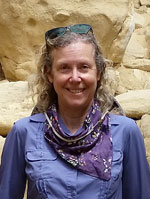 Geography has many grand challenges for the 21st Century: combatting climate change and biodiversity loss; providing clean water; investigating safe refuge, health care, education, and poverty; preparing for natural hazards, and ensuring food security among many. Another grand challenge is ensuring a harassment-, bullying-, and bias-free Geography workplace, to ensure that progress continues on our other grand challenges. This is a “climate change” that we must unite around. This is not an easy topic to write about, but it is my civic and professional duty.
Geography has many grand challenges for the 21st Century: combatting climate change and biodiversity loss; providing clean water; investigating safe refuge, health care, education, and poverty; preparing for natural hazards, and ensuring food security among many. Another grand challenge is ensuring a harassment-, bullying-, and bias-free Geography workplace, to ensure that progress continues on our other grand challenges. This is a “climate change” that we must unite around. This is not an easy topic to write about, but it is my civic and professional duty.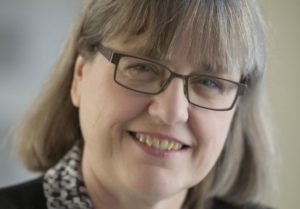

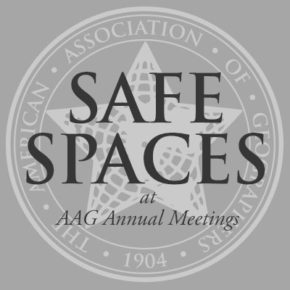 As I wrote in my September 2018 column, the AAG Council appointed a committee to work on improving and strengthening our AAG Meeting Conduct policies, to make our Annual Meeting a safer place. The AAG Inclusion Committee will be presenting their findings and recommendations to AAG Council to consider this fall, so we can move forward with a new plan. I am grateful to the committee, led by Dr. Lorraine Dowler, for their hard work on this. Stepwise, there are other ways we can address the issue of harassment, bullying, and bias in our community and institutions. One of the informal observations by the Inclusion Committee was that science organizations seem to be ahead of the issues in several senses. For the rest of this column, I will share some of the best practices of other organizations, and set an agenda for where we may ask the AAG Council and our membership to go next.
As I wrote in my September 2018 column, the AAG Council appointed a committee to work on improving and strengthening our AAG Meeting Conduct policies, to make our Annual Meeting a safer place. The AAG Inclusion Committee will be presenting their findings and recommendations to AAG Council to consider this fall, so we can move forward with a new plan. I am grateful to the committee, led by Dr. Lorraine Dowler, for their hard work on this. Stepwise, there are other ways we can address the issue of harassment, bullying, and bias in our community and institutions. One of the informal observations by the Inclusion Committee was that science organizations seem to be ahead of the issues in several senses. For the rest of this column, I will share some of the best practices of other organizations, and set an agenda for where we may ask the AAG Council and our membership to go next.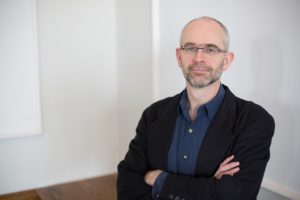 James McCarthy is the Nature and Society editor for the Annals of the American Association of Geographers and a Professor in the Graduate School of Geography at Clark University. His work analyzes the interactions of political economy and environmental politics, with particular emphases on rural areas, renewable energy, property relations, and social movements. He has published widely on these themes in geography and related disciplines, including two major edited volumes and over 50 articles and chapters. He has carried out research on natural resource management, energy policy, and connections between rural landscapes and livelihoods for the Ford Foundation and Oxfam America. Prior to coming to Clark in 2011, he was an Assistant and Associate Professor of Geography at Penn State University. His current research focuses on the relationships among climate change, renewable energy, and the political economy of capitalism, focusing in particular on the ways in which a renewable energy sector booming in the context of climate change is taking up land and other natural resources in ways that may slow further climate change on the one hand, but create new social and environmental claims, impacts, and conflicts on the other.
James McCarthy is the Nature and Society editor for the Annals of the American Association of Geographers and a Professor in the Graduate School of Geography at Clark University. His work analyzes the interactions of political economy and environmental politics, with particular emphases on rural areas, renewable energy, property relations, and social movements. He has published widely on these themes in geography and related disciplines, including two major edited volumes and over 50 articles and chapters. He has carried out research on natural resource management, energy policy, and connections between rural landscapes and livelihoods for the Ford Foundation and Oxfam America. Prior to coming to Clark in 2011, he was an Assistant and Associate Professor of Geography at Penn State University. His current research focuses on the relationships among climate change, renewable energy, and the political economy of capitalism, focusing in particular on the ways in which a renewable energy sector booming in the context of climate change is taking up land and other natural resources in ways that may slow further climate change on the one hand, but create new social and environmental claims, impacts, and conflicts on the other.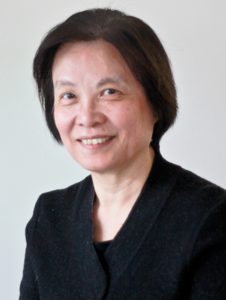
 This column begins with special thanks and recognition of our outgoing President Dr. Derek Alderman, and outgoing Past President Dr. Glen MacDonald. Please join me in recognizing their leadership in moving the association forward on so many important fronts, ranging from civil rights to environmental security. We must carry this momentum forward from the strong foundations they established, and I am honored to take up the baton as your new AAG president… In my first presidential column, I address a matter of human rights and global understanding, to which geographers have much to contribute.
This column begins with special thanks and recognition of our outgoing President Dr. Derek Alderman, and outgoing Past President Dr. Glen MacDonald. Please join me in recognizing their leadership in moving the association forward on so many important fronts, ranging from civil rights to environmental security. We must carry this momentum forward from the strong foundations they established, and I am honored to take up the baton as your new AAG president… In my first presidential column, I address a matter of human rights and global understanding, to which geographers have much to contribute. The official #aagDC conference hotels are now open for reservations. As you prepare to travel to Washington, DC, explore the Marriott Wardman Park and the Omni Shoreham – the co-headquarters for the 2019 AAG Annual Meeting. The Marriott and Omni are conveniently located directly across the street from each other in DC’s Woodley Park neighborhood. #aagDC will overlap with DC’s renowned Cherry Blossom Festival, which attracts more than a million tourists each year. Because of this, AAG has reserved a block of discounted rooms for Annual Meeting attendees.
The official #aagDC conference hotels are now open for reservations. As you prepare to travel to Washington, DC, explore the Marriott Wardman Park and the Omni Shoreham – the co-headquarters for the 2019 AAG Annual Meeting. The Marriott and Omni are conveniently located directly across the street from each other in DC’s Woodley Park neighborhood. #aagDC will overlap with DC’s renowned Cherry Blossom Festival, which attracts more than a million tourists each year. Because of this, AAG has reserved a block of discounted rooms for Annual Meeting attendees.
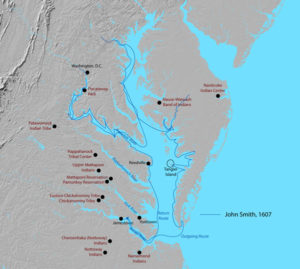
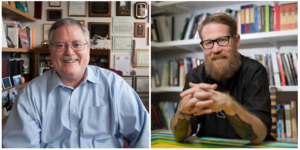
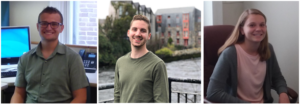 The AAG is pleased to have three interns join the AAG staff this summer. Alex Lafler, a junior at Michigan State University, is pursuing a BS in Geographic Information Science and a BA in Human Geography (along with a Minor in Environment and Health), Christian Meoli, a senior at the University of Mary Washington, is double majoring in Geography and Environmental Science with a certificate in GIS, and Jenny Roepe, a senior at Virginia Polytechnic Institute and State University, is pursuing a B.A. in geography with a minor in geographical information systems and urban and public issues.
The AAG is pleased to have three interns join the AAG staff this summer. Alex Lafler, a junior at Michigan State University, is pursuing a BS in Geographic Information Science and a BA in Human Geography (along with a Minor in Environment and Health), Christian Meoli, a senior at the University of Mary Washington, is double majoring in Geography and Environmental Science with a certificate in GIS, and Jenny Roepe, a senior at Virginia Polytechnic Institute and State University, is pursuing a B.A. in geography with a minor in geographical information systems and urban and public issues. The AAG is excited to announce that the first 30 of 308 films in the Geographers on Film series have been digitized and are now available online from the Library of Congress. Geographers on Film is a collection of recorded video interviews conducted with hundreds of geographers between August 1970 and the mid-1980s, including scholars who have shaped the discipline such as Carl Sauer, Richard Hartshorne, Wilbur Zelinsky, Richard Chorley, Mildred Berman, Harold Rose, Jan Monk, Yi-Fu Tuan and Rickie Sanders. The late Maynard Weston Dow (1929 – 2011), Professor Emeritus at Plymouth State College, and Nancy Dow largely produced the series over 40 years.
The AAG is excited to announce that the first 30 of 308 films in the Geographers on Film series have been digitized and are now available online from the Library of Congress. Geographers on Film is a collection of recorded video interviews conducted with hundreds of geographers between August 1970 and the mid-1980s, including scholars who have shaped the discipline such as Carl Sauer, Richard Hartshorne, Wilbur Zelinsky, Richard Chorley, Mildred Berman, Harold Rose, Jan Monk, Yi-Fu Tuan and Rickie Sanders. The late Maynard Weston Dow (1929 – 2011), Professor Emeritus at Plymouth State College, and Nancy Dow largely produced the series over 40 years.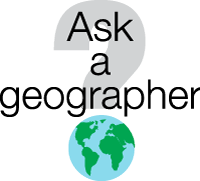
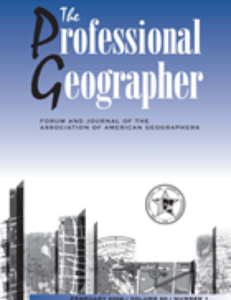
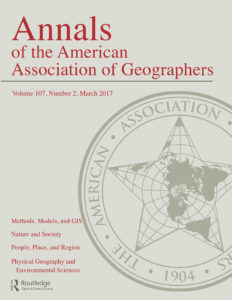
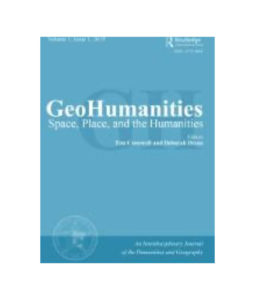 GeoHumanities features articles that span conceptual and methodological debates in geography and the humanities; critical reflections on analog and digital artistic productions; and new scholarly interactions occurring at the intersections of geography and multiple humanities disciplines. There are full length scholarly articles in the Articles section and shorter creative pieces that cross over between the academy and creative practice in the Practices and Curations section.
GeoHumanities features articles that span conceptual and methodological debates in geography and the humanities; critical reflections on analog and digital artistic productions; and new scholarly interactions occurring at the intersections of geography and multiple humanities disciplines. There are full length scholarly articles in the Articles section and shorter creative pieces that cross over between the academy and creative practice in the Practices and Curations section.

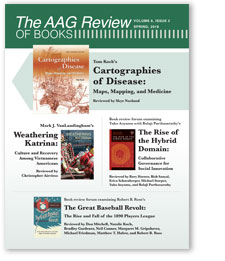 Volume 6, Issue 2 of the quarterly The AAG Review of Books has now been published online. In addition to scholarly reviews of recent books related to geography, public policy and international affairs, this issue features longer book review fora of Refugees in Extended Exile: Living on the Edge, The Rise of the Hybrid Domain: Collaborative Governance for Social Innovation, and The Great Baseball Revolt: The Rise and Fall of the 1890 Players League.
Volume 6, Issue 2 of the quarterly The AAG Review of Books has now been published online. In addition to scholarly reviews of recent books related to geography, public policy and international affairs, this issue features longer book review fora of Refugees in Extended Exile: Living on the Edge, The Rise of the Hybrid Domain: Collaborative Governance for Social Innovation, and The Great Baseball Revolt: The Rise and Fall of the 1890 Players League.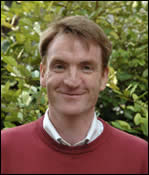
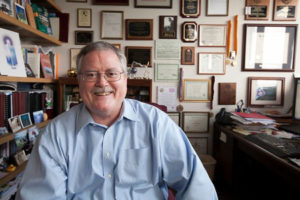 The Physical Geography, Earth and Environmental Sciences section editor of the Annals of the American Association of Geographers is David Butler. Butler is a Texas State University System Regents’ Professor in the Department of Geography at Texas State University where he teaches courses on geomorphology, landscape biogeography, biogeomorphology, and Nature and Philosophy of Geography. With research interests that include geomorphology, biogeography, natural hazards, mountain environments and environmental change, Butler has considerable experience working with physical geography topics. He has also been the recipient of several awards during his career including the Distinguished Career Award from the Biogeography Specialty Group, the Geomorphology Specialty Group, and the Mountain Geography Specialty Group of the AAG as well as a variety of teaching and mentoring awards.
The Physical Geography, Earth and Environmental Sciences section editor of the Annals of the American Association of Geographers is David Butler. Butler is a Texas State University System Regents’ Professor in the Department of Geography at Texas State University where he teaches courses on geomorphology, landscape biogeography, biogeomorphology, and Nature and Philosophy of Geography. With research interests that include geomorphology, biogeography, natural hazards, mountain environments and environmental change, Butler has considerable experience working with physical geography topics. He has also been the recipient of several awards during his career including the Distinguished Career Award from the Biogeography Specialty Group, the Geomorphology Specialty Group, and the Mountain Geography Specialty Group of the AAG as well as a variety of teaching and mentoring awards. Nik Heynen is the Human Geography editor for the Annals of the American Association of Geographers, a Professor in the Department of Geography at the University of Georgia, and an adjunct Professor in the Department of Anthropology. At the University of Georgia, Heynen teaches mostly large introductory classes, in addition to graduate seminars.
Nik Heynen is the Human Geography editor for the Annals of the American Association of Geographers, a Professor in the Department of Geography at the University of Georgia, and an adjunct Professor in the Department of Anthropology. At the University of Georgia, Heynen teaches mostly large introductory classes, in addition to graduate seminars.